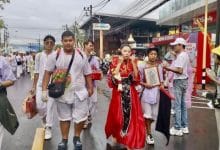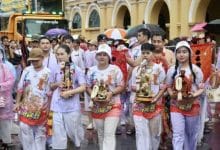Celebrating the Phuket Vegetarian Festival 2025: Where to go and what to eat
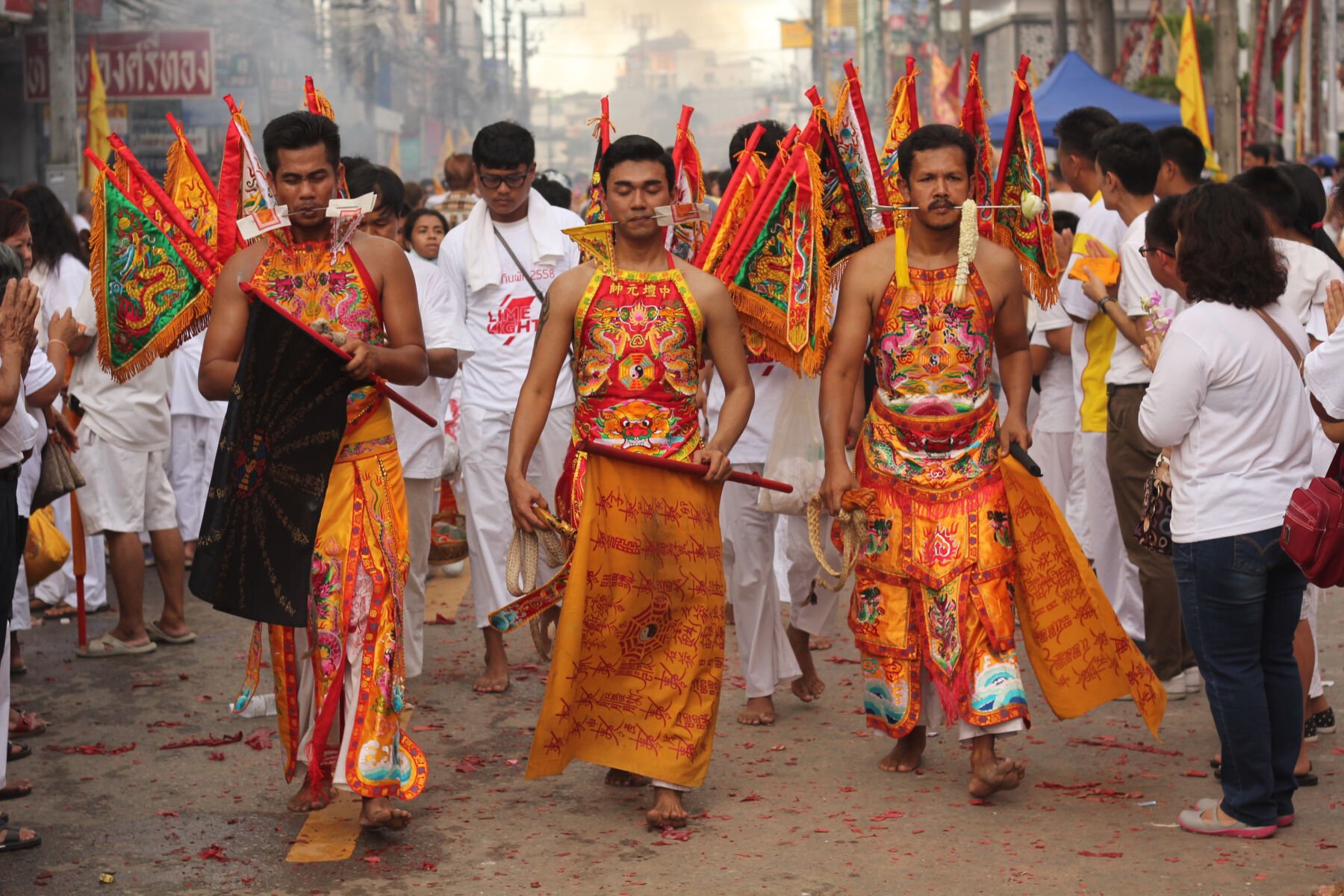
The annual Phuket Vegetarian Festival is one of the most popular festivals in Thailand. Also known as the Nine Emperor Gods Festival or Jay Festival, the celebration takes place on the 9th lunar month of the Chinese calendar. And this year, it falls on October 20 to 29, 2025. During the festival, those who celebrate will observe a strict vegetarian diet. They also organise a street procession and, for the chosen few, practice self-mutilation. Here’s what you need to know if you want to join the festivities.
Where to go in Phuket to join the celebrations and rituals?
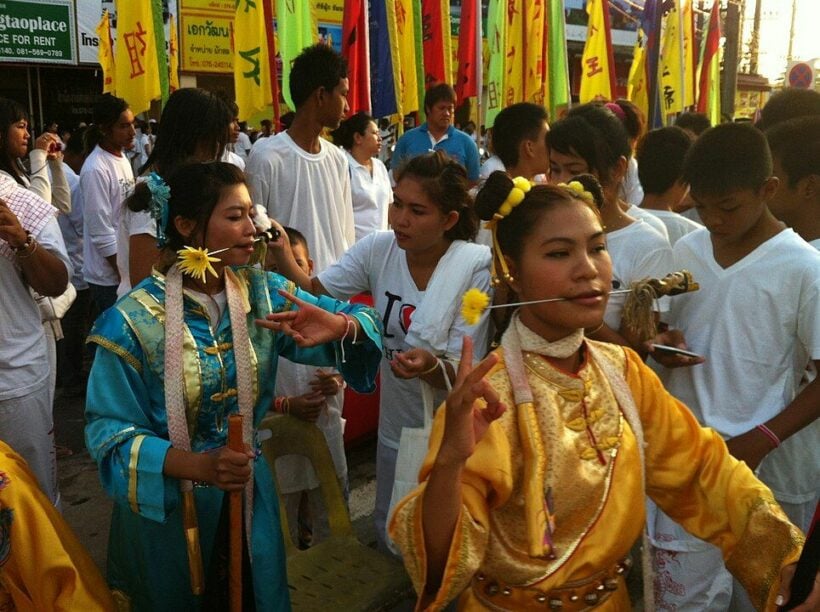
There are over 40 Chinese shrines around the island that participate in the festival. Some of the most impressive celebrations can be found in Put Jaw Shrine, Jui Tui Shrine, Bang Neow Shrine, Kathu Shrine, Sam Pai Kong Shrine, and Wat Sri Sunthon. For more details on all the shrines that you can celebrate the vegetarian festival, read our recent article on it.
If you want to witness the biggest processions, head to Baan Tha Rua Shrine, Thepkrasattri Road, not far from the Heroines’ Monument or Jui Tui. From Jui Tui, the parade features devotees dressed as Chinese goddesses and powerful Chinese warriors. The Chinese warriors perform acts of self-mutilation. It’s a parade to be seen once in your life, but definitely not for the faint of heart.
What to eat during the Phuket Vegetarian Festival
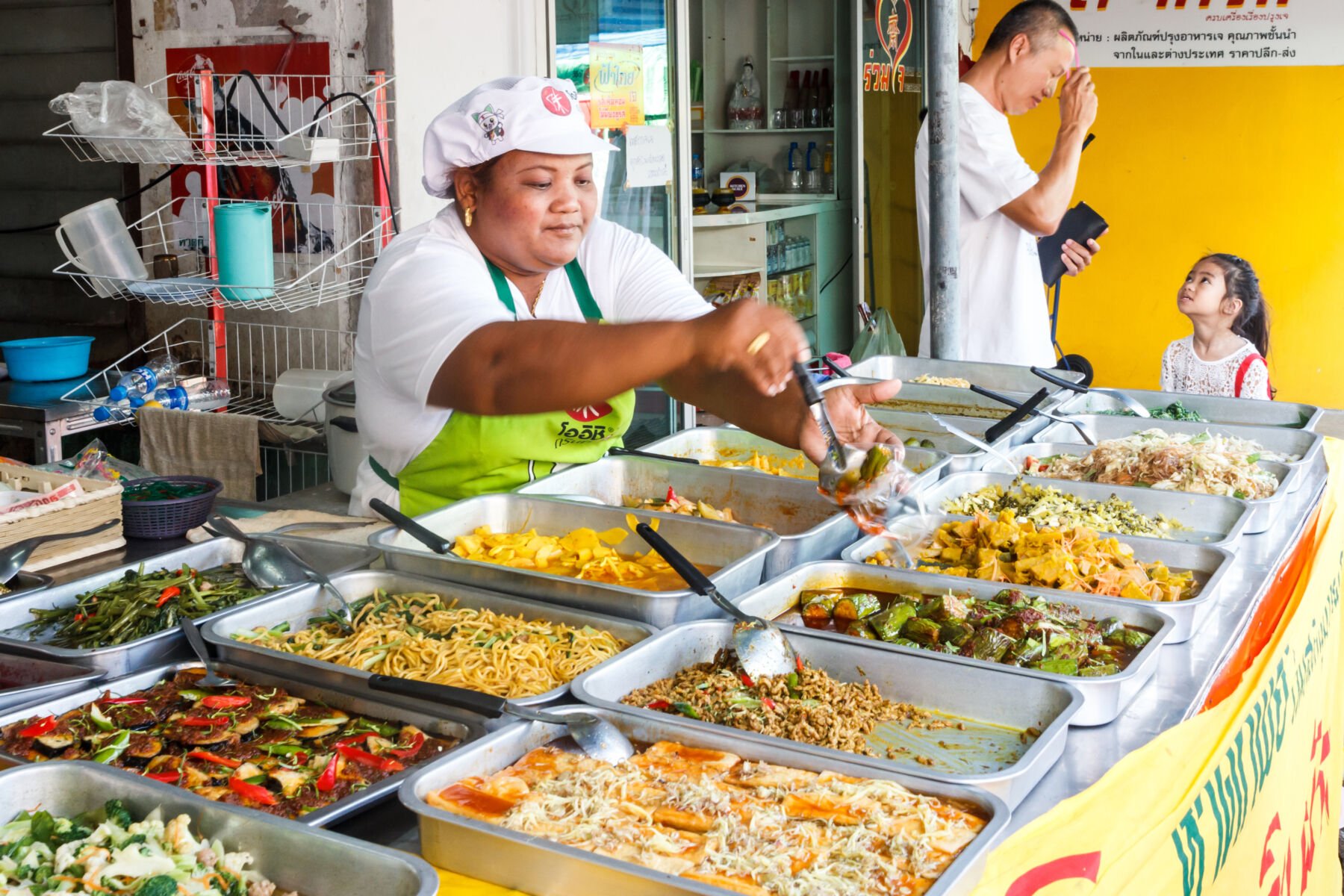
During the festival, food stalls and restaurants displaying yellow flags with red “เจ” lettering indicate their commitment to serving “Je” cuisine. Remarkably, many establishments, including major grocery chains and convenience stores such as 7-Eleven, temporarily stop offering non-vegetarian items altogether for the duration of the festival.
Je” food (อาหารเจ) is a dietary practice that goes beyond typical vegetarianism or veganism. This cuisine adheres to strict principles aimed at purifying both body and mind.
Here’s what you need to know about “Je” food:
1. Plant-based foundation: All animal products, including meat, fish, and dairy, are strictly forbidden during this celebration. As the festival focuses on vegetarianism and spiritual cleansing, participants abstain from consuming any animal-derived foods.
2. Exclusion of pungent ingredients: Garlic, onions, scallions, chives, and leeks are omitted, as they’re believed to stimulate strong emotions and bodily reactions.
3. Protein alternatives: Tofu, mushrooms, and legumes feature prominently as meat substitutes in various dishes. These versatile ingredients offer protein-rich alternatives that can be prepared in numerous ways to mimic the texture and flavour of the meat.
4. Staple carbohydrates: Rice and noodles serve as the base for many “Je” meals, complemented by vegetables and flavorful, garlic-free sauces.
Despite the dietary restrictions, “Je” cuisine offers an array of delicious and innovative meals that celebrate the essence of mindful, healthy eating. Vegetable dumplings, tofu dishes, and coconut-based desserts are particularly popular during the festival, so be sure to give them a try!
5 best vegan restaurants in Phuket
If you are having trouble picking the perfect restaurant to enjoy vegan cuisine, here are our top picks:
For more details about these restaurants, you can check out our detailed guide on these vegan restaurants in Phuket.
What is the Phuket Vegetarian Festival?
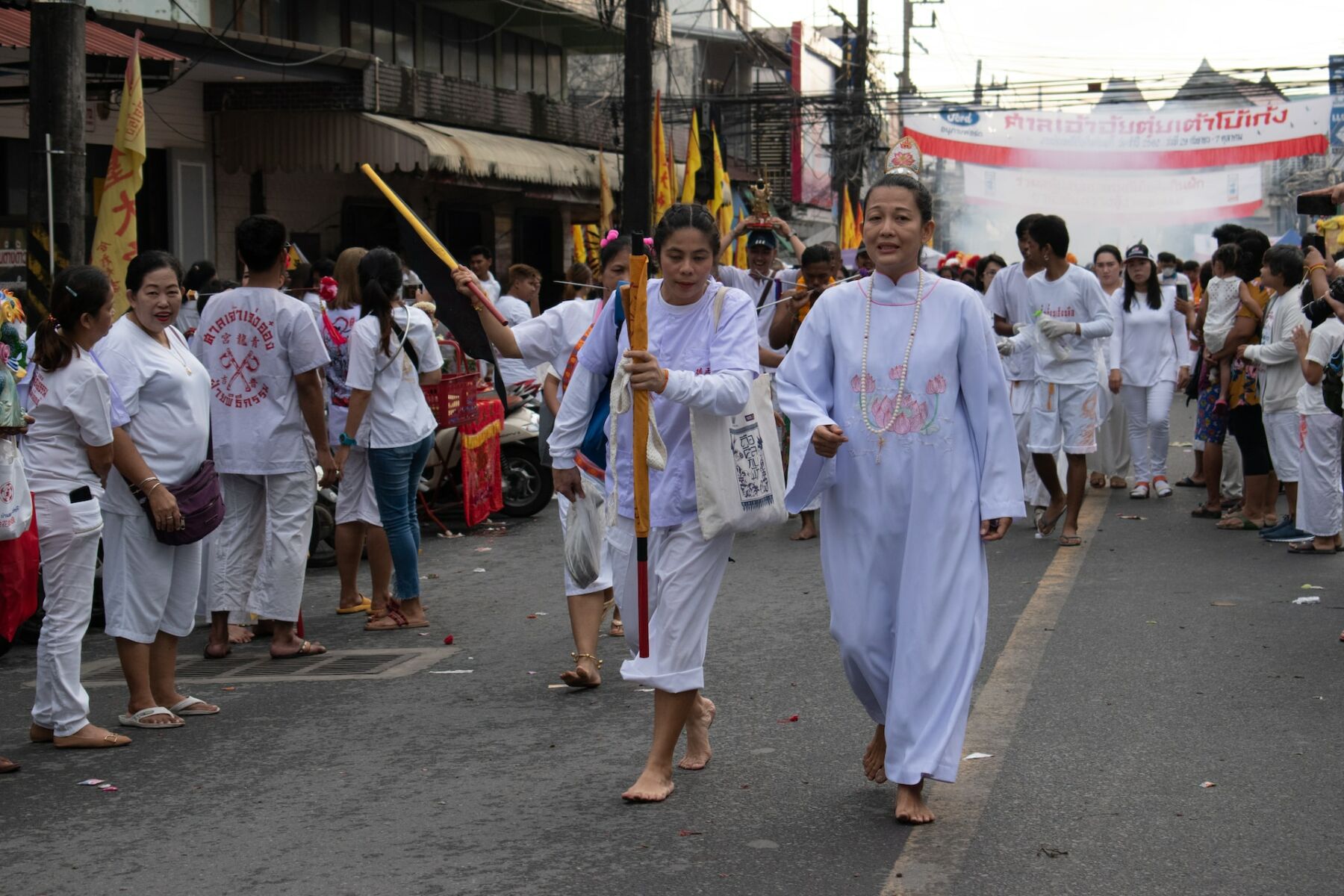
The Phuket Vegetarian Festival is a Taoist celebration that welcomes the nine deities from heaven. It’s celebrated for spiritual cleansing, physical health, merit-making, conferring good fortune in the future, and making sure of prosperity and long life. During the nine-day festival, devotees follow a strict vegan diet by omitting animal products, as well as onion, garlic, Chinese chive, and Chinese single-bulb garlic, to cleanse and purify the body. In addition to the vegetarian diet, devotees need to wear white and keep pure thoughts. Thus, they need to give up sex, alcohol, and stimulants.
In Phuket, devotees will assemble in every Chinese shrine and do religious processions. Beyond switching from meat to tofu, the Phuket Vegetarian Festival is known for its over-the-top and extreme rituals. Not only do devotees adopt a special diet, but a select few also prove their devotion by doing self-mutilation. At the height of the celebration, you can see the often-gruesome rituals. These include cheek piercing with extreme objects and barefoot walking over hot coals, among others. Devotees believe that the Chinese gods will protect them from harm.
The history
The history behind the Phuket Vegetarian Festival is unclear. The most widely accepted story goes that many years ago, a famous Chinese opera crew travelled to Phuket. As soon as they arrived, they fell ill with malaria. The group decided to go on a strict vegan diet and pray to the Nine Emperor Gods to purify their bodies and minds after traditional medicine failed to help them heal. Members of the opera group consequently regained their health, which aroused the people’s intense curiosity. The island’s Chinese community at the time accepted the practice widely. It has been passed down from generation to generation ever since.
The celebrations
The Phuket Vegetarian Festival showcases rich spiritual and religious practices, extending far beyond dietary restrictions. Participants engage in various rituals aimed at purifying both body and soul.
-
Raising Bamboo Pole
The annual Phuket Vegetarian Festival kicks off with the raising of a bamboo pole in every Chinese shrine in Phuket town. The pole is raised to invite the Nine Emperor Gods down to earth. Although this ceremony is generally quiet and calm, the following week of the Vegetarian Festival is chaotic and noisy.
-
Visiting Sacred Shrine
Devotees make their way to Chinese temples, offering heartfelt prayers and participating in intricate rituals honouring the Nine Emperor Gods. The air fills the whole room with the fragrance of incense and the warm glow of candles, while carefully prepared vegetarian offerings symbolize devotion and respect.
-
Wearing symbolic attire
White clothing becomes a popular wear during the festival, with participants dressing in pristine garments to represent purity of body and spirit. This visual unity is particularly striking among devout followers of the festival’s strictest guidelines.
-
Being sober
Beyond dietary restrictions, many practitioners embrace a sobriety approach to purification. This often includes restricting alcohol, tobacco, and sexual activities for the duration of the festival, fostering a state of heightened spiritual awareness.
-
Doing meditative practices
Devotees immerse themselves in ritualistic observances such as meditation and rhythmic chanting. These practices, conducted within the confines of Chinese shrines, serve to deepen spiritual connections.
-
Self-mortification
Participants or spirit mediums, known as “Ma Song”, are believed to be possessed by deities, and they undergo extreme acts of self-mortification, such as piercing their cheeks with sharp objects, walking on hot coals, or slashing their tongues. The Ma Song do not feel pain due to their belief that the gods protect them from harm, and they perform these acts as a way to absorb the community’s misfortune and bring good luck to everyone. While these rituals are controversial and intense, they are considered by many as an essential part of the Phuket Vegetarian Festival’s spiritual essence.
The Phuket Vegetarian Festival is deeply associated with Chinese culture and religion. While the main celebrations take place in numerous Chinese shrines in Phuket town, the festival’s influence reaches throughout Phuket. During this period, the entire island comes alive with various events and vegetarian food stalls.
The rituals
What exactly are the rituals of the Phuket Vegetarian Festival, and what do they represent? The festival is defined by a series of processions, including the street procession, the ceremonial bridge crossing, the fire-walking ritual, and the farewell ritual.
The street procession is perhaps the most striking event. Shrines across Phuket hold it on various days. The procession offers a unique opportunity for onlookers to witness the blessings of the deities who are believed to possess the spirit mediums. People set up altars outside their homes, adorned with Chinese embroidered table aprons. They light candles, burn incense, and display offerings like flowers, fruit, sweets, and tea.
Another significant ritual is crossing the ceremonial bridge. Devotees believe this act purifies them from impurities and misfortunes. After crossing, a red seal of the Nine Emperor Gods is stamped on their backs to mark their cleansing from any potential sins or calamities.
Equally significant is the fire-walking ritual. Symbolically, fire is thought to cleanse impurities and ward off evil. According to local belief, only those who are genuinely purified can cross the fire without being harmed.
The festival concludes with the farewell ritual. On the ninth and final day, the Jade Emperor and the Nine Emperor Gods are sent back to the heavens. At midnight, the streets of Phuket are filled with people eager to witness the grand send-off, particularly around Thalang Road, Phuket Road, Surin Circle Clock Tower, and the route leading to Saphan Hin.
https://www.youtube.com/watch?v=49SUStA5hi8
The Vegetarian Festival in other cities
The Vegetarian Festival is primarily celebrated in Phuket. However, cities like Bangkok and Chiang Mai also hold their own versions of the festival, though the celebrations are more modest in comparison.
Bangkok
In Bangkok, the best place to celebrate the Vegetarian Festival is Chinatown or Yaowarat. This year, you’ll find numerous stalls selling a wide variety of delicious meatless dishes, especially in the Yaowarat Old Market (Yaowarat 6). Plenty of restaurants and hotels across the city are also offering Vegetarian Festival promotions.
Chiang Mai
If you want to celebrate in Chaing Mai, go to Warorot Market, Chiang Mai’s oldest market, where you can grab some delightful vegan dishes.
Are you ready to experience this gruesome but colourful festival? Remember to be respectful, especially when you’re inside a Chinese shrine. Moreover, wear white if you want to blend in with the local community. Lastly, be sure to bring your camera to capture all of the unusual and eerie sights — only if you can stomach it, of course!
Latest Thailand News
Follow The Thaiger on Google News:
